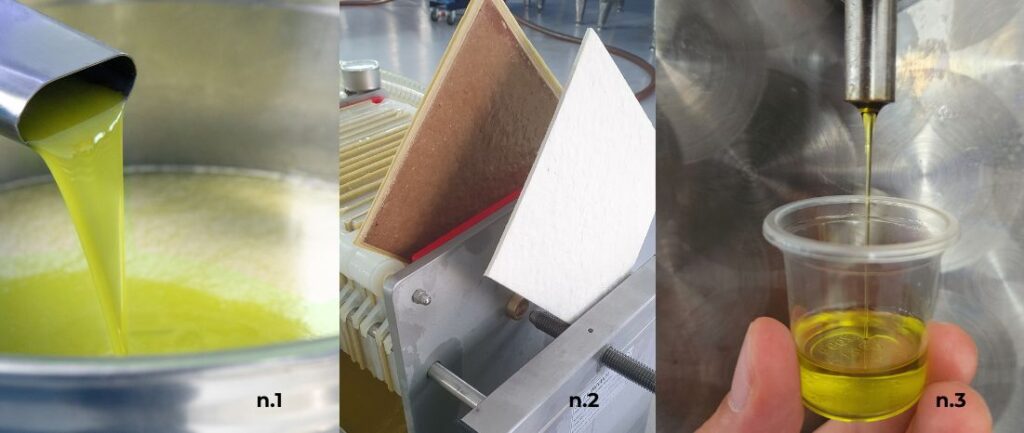Before deciding which extra virgin olive oil to choose, it’s helpful to understand what “filtered” and “unfiltered” (also known as “raw”) oil actually mean.
Unfiltered oil is not subjected to filtration after extraction, but may go through a natural decanting phase. It often appears cloudy or opaque because it still contains bits of olive pulp, micro-droplets of water, and suspended particles.
Filtered oil, on the other hand, undergoes a physical process (using cellulose or cotton filters, without chemical additives) to remove moisture and solid residues. This makes it clearer and more stable over time.
When it comes to unfiltered extra virgin olive oil, many misconceptions circulate. Let’s debunk the main myths:
1. Raw oil is more natural
Myth: Unfiltered oil is more “natural” because it hasn’t been processed.
Reality: Unfiltered oil is simply freshly extracted and still contains solids and water. Filtration is a mechanical and healthy process that removes residues which could lead to oxidation and premature spoilage.
2. Raw oil is safer because filtered oil can be adulterated
Myth: Filtration masks adulteration practices.
Reality: Adulteration involves blending or adding low-quality oils. Filtration does not alter the origin of the product—it retains the polyphenols and improves shelf life without manipulating the oil.
3. Raw oil is less acidic
Myth: Skipping filtration reduces acidity.
Reality: Acidity depends on olive quality, processing time, and extraction methods—not on filtration. In fact, unfiltered oil, due to its water and enzyme content, may see an increase in acidity over time.
4. Raw oil is richer in polyphenols
Myth: Sediments preserve more polyphenols.
Reality: While some water-bound polyphenols may slightly decrease after filtration, the loss is minimal. Filtered oils retain high polyphenol levels, while unfiltered oils lose stability over time.
Unfiltered oil (new oil) can be excellent if consumed within a few weeks of milling, when it’s full of intense flavors.
After 1–3 months, the risk of oxidation and spoilage increases because sediments tend to ferment.
Therefore, it’s recommended to consume unfiltered oil quickly. Otherwise, go with filtered oil for maximum shelf life and safety.
In the images below, you can clearly see what happens during the oil filtration process. The filter consists of cellulose sheets (called “filter cartons”) through which the oil is passed immediately after extraction (Image 1).
In the next photo (Image 2), you can see a clean, unused filter and another after filtration—visibly saturated with residue. In the final photo (Image 3), you can see the end result: a clear, impurity-free oil.

As a matter of fact, what gets trapped in the filter are solid particles and micro-droplets of water still present in the oil—the same residues that would otherwise settle at the bottom of the bottle. Over time, these sediments ferment and oxidize, compromising the oil’s aroma, flavour, and accelerating its aging.
The result of filtration is therefore a clearer, more stable oil with a longer shelf life, preserving its freshness and quality over time.
Filtration is a healthy and essential practice to make Extra Virgin Olive Oils safer and more stable.
If you plan to consume it right away (within a few weeks), unfiltered oil is fine.
Therefore, for longer use, filtered oil is the better choice: it ensures quality for many weeks, especially when stored properly (dark bottle, away from heat).
In conclusion, we can say: don’t fear filtered Extra Virgin Olive Oil! If properly stored, a good filtered oil remains rich in polyphenols, stable, and nutritionally valuable.
All our oils are filtered. However, if specifically requested by our customers, we can bottle unfiltered oil in limited quantities at the very start of the harvest season.
Still have questions or doubts? Contact us and we’ll help you choose the right EVOO based on your preferences and habits!